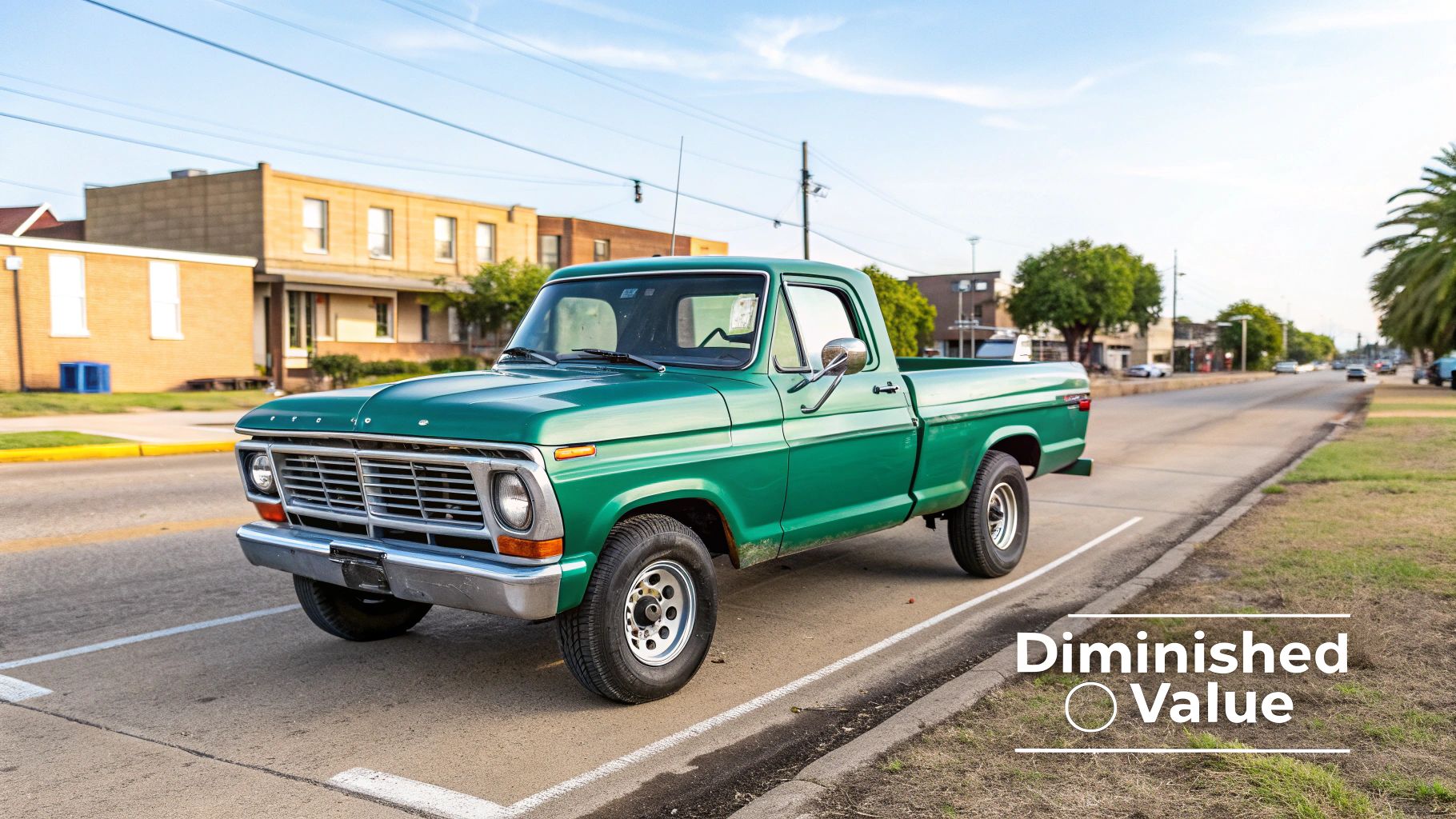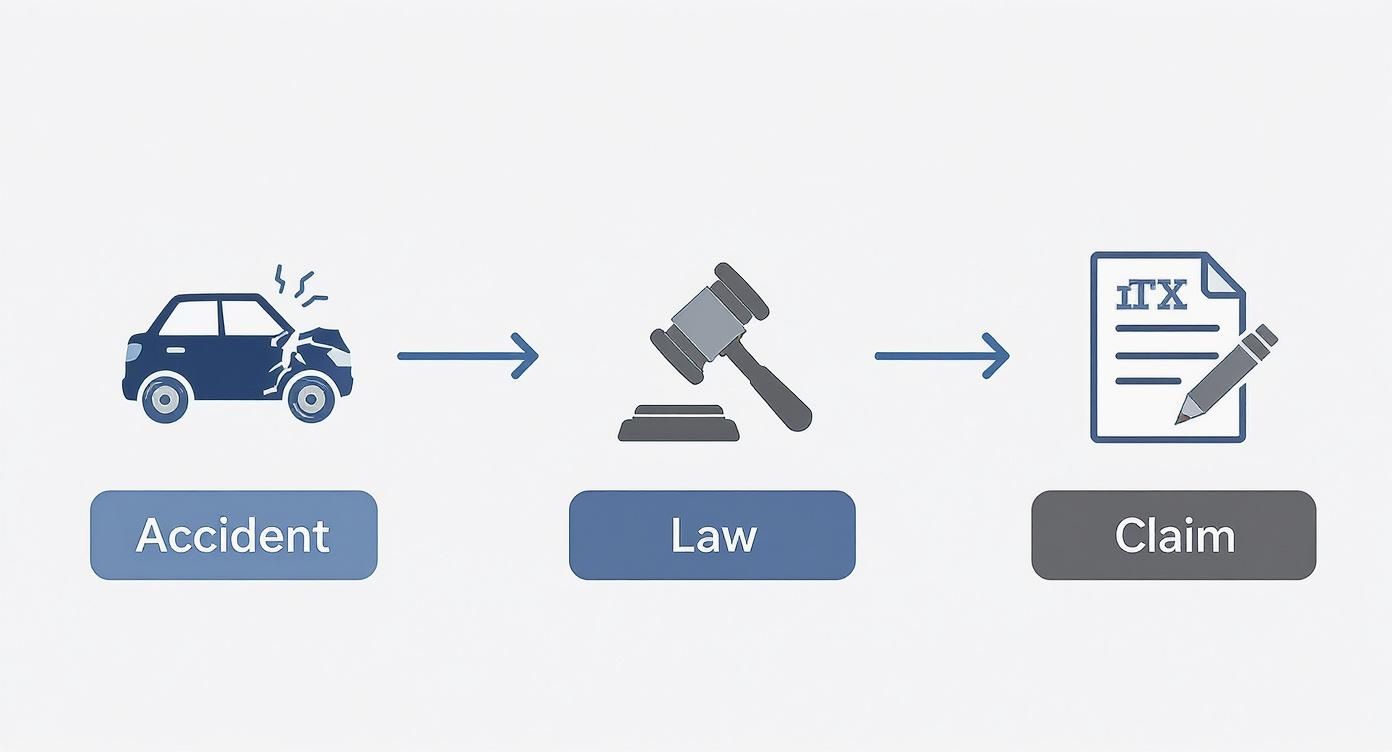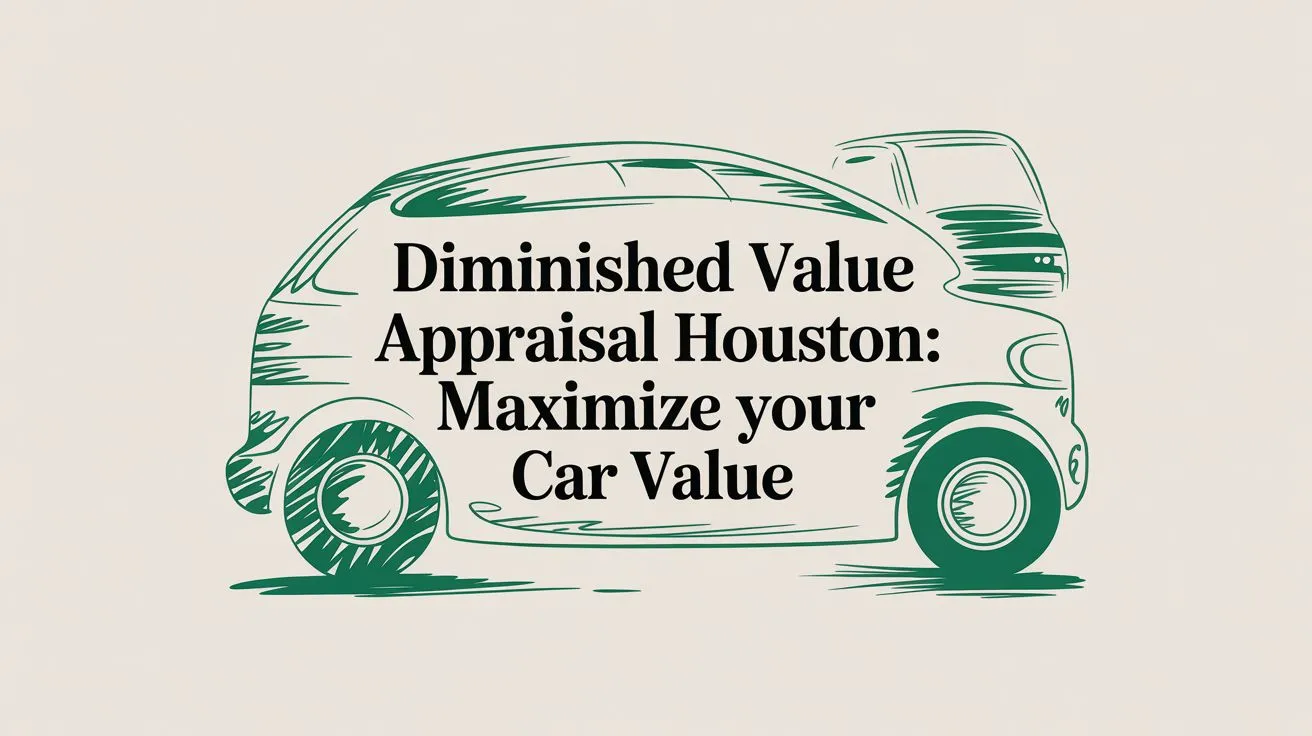Even after a flawless repair job, your car’s accident history can take a huge bite out of its resale value. This permanent financial hit is called diminished value, and a professional diminished value appraisal in Houston is the single most important tool for getting that money back from the at-fault driver’s insurance company. Think of it as the data-backed proof you need to negotiate a fair settlement.
Your Car’s Hidden Financial Damage After a Houston Wreck
Let’s say your perfectly repaired Ford F-150 is back from the body shop, and it looks brand new. The problem is, its vehicle history report on CARFAX or AutoCheck now has a permanent blemish: a collision record.
When you eventually go to sell or trade it in, that accident history will scare off buyers or give them powerful leverage to offer you thousands less. That loss in your car’s value after an accident is the reality of diminished value.
This immediate loss in market value—which happens the second the accident occurs—is officially known as Inherent Diminished Value. It has nothing to do with the quality of the repairs. The simple, unchangeable fact that the vehicle was in a wreck makes it less desirable in the marketplace.

Why the Burden of Proof Is on You
While Texas law acknowledges your right to be compensated for this loss, there’s a catch. The burden of proof is 100% on you. The at-fault driver’s insurance company isn’t going to offer what you’re truly owed. Their goal is to minimize their payout, and they’ll often argue that the repairs made your car “whole again.”
This is where a professional diminished value appraisal in Houston becomes your biggest ally. It provides independent, data-backed evidence that spells out the exact amount of value your vehicle has lost. Without it, your claim is just your opinion against a massive insurance corporation.
A certified appraisal turns your request into an evidence-based demand. It brings the specific market data and expert analysis needed to prove your financial damages and shut down the adjuster’s lowball offers.
A generic online calculator won’t cut it. You need a comprehensive report from a certified appraiser that analyzes key factors like:
- Pre-Accident Value: What your vehicle was worth on the open market moments before the crash.
- Severity of Damage: A detailed look at the structural and cosmetic damage.
- Market Stigma: How buyers in the local Houston area react to vehicles with an accident record.
- Comparable Sales Data: Real-world examples of similar vehicles selling for less specifically because of their accident history.
By investing in a proper appraisal, you’re arming yourself with the proof needed for a successful diminished value claim. To learn more about the specifics of diminished value, check out our detailed Diminished Value Guide. For a deeper dive into appraisal services, you might also find resources like Microestimates.com for appraisal services helpful.
Understanding Your Rights Under Texas Law
Navigating an insurance claim in Houston can feel like an uphill battle, but you need to know this: Texas law is firmly on your side when it comes to recovering diminished value. This isn’t some obscure loophole. It’s a recognized financial loss you are legally entitled to claim from the at-fault driver’s insurance company.
In Texas, you can file what’s known as a third-party diminished value claim. Put simply, if someone else caused the accident, you have the right to demand compensation from their insurance provider for the drop in your car’s resale value. The claim doesn’t stop at just the cost of repairs.
Your Legal Standing in Texas
The legal groundwork for these claims is solid. Major court decisions and state guidelines have consistently affirmed that at-fault parties are responsible for making victims “whole” again—and that includes paying for the lost market value of their vehicle.
This legal backing is your leverage. It means your claim for diminished value isn’t just a polite request; it’s a right. Insurance companies, however, often pretend this right doesn’t exist, counting on you being unaware of the law.
The core principle is straightforward: If someone else’s negligence damages your property, they are liable for the full extent of that damage. That includes the permanent stigma that now follows your vehicle.
The Clock Is Ticking: The Statute of Limitations
While the law is on your side, it won’t wait forever. Texas has a strict deadline for filing property damage claims, including diminished value. This is called the statute of limitations.
You generally have two years from the date of the accident to file a lawsuit for property damage. If you let that deadline pass, you lose your right to pursue compensation through the courts for good.
This makes acting quickly essential. The process of getting a professional diminished value appraisal in Houston, and negotiating with the insurer all takes time. Waiting until the last minute will only weaken your position.
Houston drivers have been dealing with diminished value for decades. Texas law clearly supports the right to claim this loss, a principle reinforced by cases like the 1995 Parkway Co. v. Woodruff decision and guidance from the Texas Department of Insurance. You can find out more about Texas diminished value law and its history here.
Don’t let the calendar work against you. Start the process as soon as your vehicle repairs are done to give yourself plenty of time to build a strong case and negotiate the fair settlement you deserve.
How to Get an Accurate Diminished Value Appraisal in Houston
A quick online calculator might spit out a number, but that’s not going to convince a skeptical insurance adjuster. If you want to recover your car’s lost value, you need a certified, data-driven report. Getting a professional diminished value appraisal in Houston is the single most important step you can take to turn a weak request into a strong, evidence-based demand.
The whole process kicks off by gathering a few key documents that tell the story of what happened to your vehicle. This paperwork is the foundation of a credible appraisal.
What You’ll Need for Your Appraisal
To build the strongest case possible, you’ll want to get these items ready:
- Police or Accident Report: This is the official record of the collision and identifies the at-fault driver.
- Final Repair Invoice: This document lists every part and hour of labor, proving how serious the damage was.
- Photos of the Damage: Pictures taken right after the accident—before any repairs—are powerful visual proof of the impact.
Once you have these, a certified appraiser has everything they need to dig in, analyze the facts, and calculate the precise drop in your car’s market value.
Inside a Professional Appraisal Report
A real, defensible appraisal is much more than a number on a page. It’s a detailed report that methodically lays out your financial loss in a way that insurance companies can’t ignore.
An appraisal isn’t just an opinion; it’s a market analysis. It connects the accident history on your vehicle’s record to a tangible, provable drop in what a buyer in the Houston market would be willing to pay for it.
Here’s what you’ll find inside a SnapClaim certified report:
- Comprehensive Market Analysis: We pull real sales data from the greater Houston area—including Harris, Fort Bend, and Montgomery counties—to show how local buyers react to cars with an accident history.
- Comparable Vehicle Data: The report lines up vehicles just like yours, both with and without accident records, to create a direct, side-by-side comparison that clearly shows the value gap.
- Expert Methodology: Our process is USPAP-compliant, which is the industry standard recognized by both insurers and courts. This ensures the valuation is accurate and defensible.
This flowchart breaks down how an accident translates into a legitimate diminished value claim under Texas law.

As you can see, it’s a straightforward path from the collision to exercising your right to fair compensation. This structured approach, backed by a certified report, gives your claim the authority it needs.
If you’re looking for an expert in your area, you can learn more about finding a qualified diminished value appraiser near you. By arming yourself with a professional report, you’re not just asking for a settlement—you’re presenting irrefutable proof of your financial damages.
Fighting Back Against Common Insurance Company Tactics

Once you file your diminished value claim, get ready for some pushback. It’s almost guaranteed. Insurance companies are in the business of minimizing payouts, and they have a well-worn playbook of arguments designed to devalue your claim.
But here’s the good news: knowing their moves ahead of time gives you a serious advantage. Armed with your certified appraisal, you can dismantle their arguments with cold, hard facts.
The “Repairs Made It Good as New” Argument
This is the adjuster’s go-to line. They’ll argue that since they paid to fix your car, their job is done. This argument cleverly sidesteps the entire concept of market perception.
Your response should be simple and direct. Explain that while the repairs fixed the physical damage, they did nothing to erase the financial damage—the accident history now tied to your car’s VIN. Remind them that no reasonable buyer will pay the same price for a car with a wreck on its record. Your appraisal report is the proof.
The Bogus 17c Formula
If the insurer comes back with a lowball offer, there’s a good chance it’s based on the infamous “17c formula.” This is a made-up, internal calculation insurers created to justify tiny payouts. It uses arbitrary caps and modifiers that have zero connection to real-world market data.
Key Takeaway: The 17c formula is an internal tool, not a legally recognized method for calculating diminished value in Texas. It’s designed to protect their bottom line, not to make you whole.
When the adjuster mentions Formula 17c, you can reject it with confidence. State that your claim is based on a professional, market-driven analysis specific to Houston, not some self-serving formula. You can even point them to resources that expose just how flawed the 17c formula is.
Demanding Pointless Paperwork
Some adjusters will try to wear you down by asking for extra documentation, like multiple trade-in offers from dealerships. This is a delay tactic, plain and simple.
Remember, diminished value is an inherent loss. It happened the second your car was hit. You don’t have to sell your car—or even pretend to—to prove you’ve lost money.
Your certified diminished value appraisal Houston report is the only evidence you need. If they keep asking for more, politely refer them back to your appraisal. The ball is in their court to find credible data that refutes your certified report.
Insurer Tactics vs. Your Evidence-Based Response
| Common Insurer Tactic | What They Really Mean | How Your Appraisal Responds |
|---|---|---|
| “Our high-quality repairs restored the vehicle’s value.” | “We fixed the dents, so we don’t want to talk about the permanent accident history.” | Provides market data showing repaired vehicles sell for less, proving inherent loss of value regardless of repair quality. |
| “We calculated your DV using the 17c formula, and it’s only $500.” | “We’re using our internal formula that guarantees a low payout, hoping you don’t know any better.” | Rejects the 17c formula as invalid and presents a USPAP-compliant valuation based on actual Houston market data. |
| “You need to get three trade-in offers to prove your loss.” | “We want to create more work for you, hoping you’ll get frustrated and give up.” | Establishes that diminished value is an inherent loss and does not require the owner to sell the vehicle to prove it exists. |
| “There is no diminished value on older vehicles/vehicles with high mileage.” | “We’re applying an arbitrary rule to deny your claim without doing any real market research.” | Delivers a specific valuation based on comparable vehicle sales, proving market value exists (and can be lost) at any age or mileage. |
By anticipating these moves, you stay in control of the negotiation. Let your appraisal do the talking and stand firm on the facts.
Using Your Report to Maximize Your Settlement
Your certified appraisal isn’t just a document—it’s your single most powerful negotiation tool. Armed with this proof, you’re no longer just asking for compensation; you’re presenting a data-backed case with the same authority as the insurance adjuster.
Crafting Your Demand Letter
First, you need to formally present your claim in a demand letter. This is a straightforward, professional letter that lays out the facts and clearly states what you’re asking for.
Here’s what you need to include:
- A Clear Summary: Briefly state the accident date, your claim number, and that you’re seeking compensation for your vehicle’s inherent diminished value.
- The Demand Amount: State the exact diminished value figure from your appraisal report.
- The Evidence: Attach the full copy of your diminished value appraisal Houston report.
Reference the report directly in your letter. Something as simple as, “As detailed in the attached certified appraisal from SnapClaim, my 2022 Ford F-150 has suffered a market value loss of $4,850 due to the collision,” works perfectly.
Submitting and Following Up on Your Claim
Always send your letter and appraisal via certified mail with a return receipt requested. This creates an undeniable paper trail, proving exactly when the insurance company received your documents.
Once it’s sent, be ready to follow up. If you don’t get a response within a week or two, send a polite but firm follow-up email and make a phone call. Keep a simple log of every communication: the date, time, who you spoke with, and a summary of the conversation.
If you hit a wall, the Texas Department of Insurance provides resources for consumers dealing with auto claims. This official resource outlines your rights and details the complaint process if an insurer acts in bad faith.
SnapClaim’s Money-Back Guarantee: If your insurance recovery from the claim is less than $1,000, SnapClaim refunds the full appraisal fee — guaranteed.
Presenting a solid, evidence-based claim package is your best strategy. Countless vehicle owners across Texas, from Houston and Dallas to Austin and San Antonio, have successfully used this exact approach to recover what they’re rightfully owed.
FAQ: Houston Diminished Value Appraisal
Here are answers to the most common questions Houston drivers ask about diminished value claims.
Can I claim diminished value if the accident wasn’t my fault?
Yes. In Texas, you can only file a diminished value claim against the at-fault driver’s insurance company. This is known as a third-party claim. Your own collision coverage is designed to pay for repairs, not for the loss in market value.
How much is a professional diminished value appraisal?
Think of a certified appraisal as an investment, not a cost. The fee is a small fraction of the thousands of dollars you could recover in your settlement. While online calculators are free, their results won’t hold up under scrutiny from an insurance adjuster. A professional report from SnapClaim provides the data-backed proof you need to negotiate effectively.
Is a diminished value claim worth it for an older car?
It absolutely can be. While newer cars often have higher diminished value amounts, a well-maintained older vehicle can still lose significant value after an accident. The key factors are the car’s pre-accident market value, its desirability, and the severity of the damage. The only way to know for sure is to get an expert evaluation.
What if the insurance company offers a low settlement?
A low offer, often based on the flawed 17c formula, is a common tactic. Do not accept it. Respond politely but firmly in writing, referring them back to your certified diminished value appraisal in Houston. Reinforce that your claim is based on real-world market data, not an internal insurance company formula. Your appraisal provides the proof you need to negotiate fairly.
Ready to get the compensation you deserve? Get your free estimate today or order a certified appraisal report to strengthen your insurance claim.
👉 Get your free estimate today or order a certifiedappraisal report!
About SnapClaim
SnapClaim is a premier provider of expert diminished value and total loss appraisals. Our mission is to equip vehicle owners with clear, data-driven evidence to recover the full financial loss after an accident. Using advanced market analysis and industry expertise, we deliver accurate, defensible reports that help you negotiate confidently with insurance companies.
With a strong commitment to transparency and customer success, SnapClaim streamlines the claim process so you receive the compensation you rightfully deserve. Thousands of reports have been delivered to vehicle owners and law firms nationwide, with an average of $6,000+ in additional recovery per claim.
Why Trust This Guide
This guide was reviewed and verified by SnapClaim’s auto appraisers, who specialize in diminished value and total loss disputes. Our team continually updates every article to reflect current insurer guidelines, valuation standards, and court-accepted appraisal practices, ensuring that you’re relying on information trusted by professionals nationwide.
Get Started Today
Whether you’re challenging a low total loss settlement or proving your vehicle’s post-repair loss in value, SnapClaim makes it simple to take the next step. Generate a free diminished value or total loss estimate in minutes and see how much compensation you may be owed.




